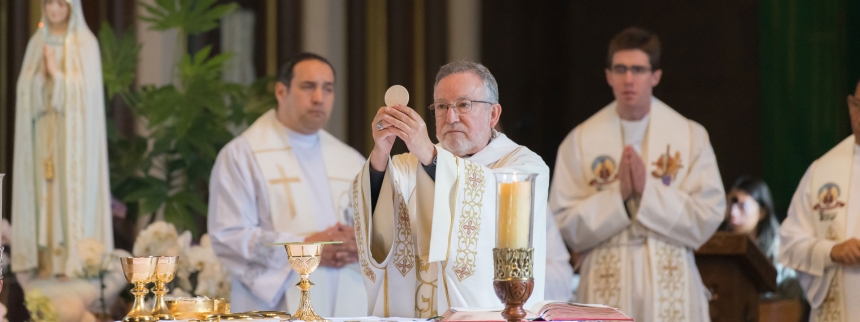
Here is the text of Bishop Jaime Soto's homily on May 24, during Mass in St. Patrick Church in Placerville, on the day four of the National Eucharistic Pilgrimage in the Diocese of Sacramento.
In the Gospel reading today (Mk 10:1-12), Jesus defended the dignity of the marriage bond. In his response to the scribes, Jesus went beyond any legal understanding of marriage. He grounds the marriage union of man and woman as part of God’s eternal plan, beyond the limitations of our own understanding of the marriage. The marriage bond of man and woman is part of divine revelation. God reveals who he is and what he is doing through marriage. At the same time, the marriage of man and woman reveals the transcendent self-giving orientation of the human person. We are most truly the image of the God when we offer ourselves to one another: exemplified by the self-giving and life-giving marriage covenant between woman and man.
This goes to the heart of divine revelation. In his encyclical Amoris Laetitia, the Holy Father Pope Francis observed that the sacred Scriptures begin with a marriage and end with a marriage.
Creation was not complete until God created both man and woman. The divine image is reflected in the union of man and woman. As Genesis announced: In “God created humanity in his image; in the image of God he created them; male and female he created them.” (Gen 1:27)
In the Book of Revelation, the author shared the following vision: “Then I saw a new heaven and a new earth. The former heaven and the former earth had passed away, and the sea was no more. I also saw the holy city, a new Jerusalem, coming down out of heaven from God, prepared as a bride adorned for her husband. I heard a loud voice from the throne saying, “Behold, God’s dwelling is with the human race. He will dwell with them and they will be his people* and God himself will always be with them [as their God].” (Rev 21:1-3)
There is an intimate, sacramental harmony between marriage and the Eucharist. Marriage reflects both God’s creation of humanity as well as God’s redemption of humanity. In the Eucharist, blessed are we who called to share in the wedding feast of the Lamb. In Holy Communion with the Blessed Sacrament we become one flesh, one body with the Lord Jesus.
Hear the words which Jesus referenced from the Book of Genesis, “The two shall become one flesh. So they are no longer two but one flesh. Therefore what God has joined together, no human being must separate.” (Mk 10:1-12). We understand these words as speaking about the marriage bond between man and woman. Hear those words again, now, speaking about the Eucharist: “The two shall become one flesh. So they are no longer two but one flesh. Therefore what God has joined together, no human being must separate.” What Jesus defended in the reading today has a much deeper reason because of the intimate, sacramental union between marriage and the Eucharist. Jesus’ declaration raises up the complementary beauty of Marriage and the Eucharist. The Eucharist is the wedding feast of the Lamb of God to which all Christian marriages give testimony. What God has joined together in both the Eucharist and marriage, no human being must separate.
The Gospel of John helps us understand more deeply the awesome revelation of divine mercy that has been given to us. Mary, the Blessed Mother of Jesus appears twice in the Gospel of John. She is present at the the wedding feast of Cana and she stands at the foot of her son’s cross. Her presence at both moments in the gospel points to their unity. They are the same moment, the same work of Jesus. In the miracle of Cana, Jesus revealed himself as the bridegroom who brings us the new wine of the kingdom. At the foot of the cross, the Lamb of God is the bridegroom who loved us and gave himself for us. Calvary was a new Genesis. Jesus was the new Adam.The Church was born from the water and blood, the new wine, that flowed from the his pierced side.
This is the love that created a new humanity. In the Eucharist we become one flesh, one body with Christ. We are no longer two but one flesh. Therefore what God has joined together, no one must separate. Blessed are all those invited to the Wedding Feast of the Lamb.

